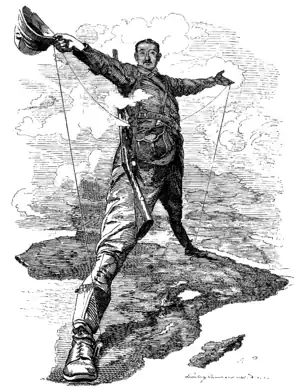Gentlemanly capitalism
Gentlemanly capitalism is a theory of New Imperialism first put forward by the historians Peter J. Cain and A. G. Hopkins in the 1980s and developed in their 1993 work British Imperialism.[1] The theory posits that British imperialism was driven by the business interests of the City of London and landed interests. It encourages a shift of emphasis, away from seeing provincial manufacturers and geopolitical strategy as important influences, and towards seeing the expansion of empire as emanating from London and the financial sector.[2][3]
| Part of a series on |
| New Imperialism |
|---|
 |
| History |
| Theory |
| See also |
References
- Peter J. Cain, and Anthony G. Hopkins, "Gentlemanly Capitalism and British Expansion Overseas I. The Old Colonial System, 1688‐1850." Economic History Review 39#4 (1986): 501-525; Cain and Hopkins. "Gentlemanly capitalism and British expansion overseas II: new imperialism, 1850‐1945." Economic History Review 40#1 (1987): 1-26; Cain and Hopkins, British Imperialism: Innovation and Expansion 1688-1914 (1993).
- Lynn, M. (1996) Review of Cain, P.J. and Hopkins, A.G. ‘British Imperialism’, The English Historical Review, vol. 111, no. 441, April 1996, pp. 501–3
- Shigeru Akita, ed., Gentlemanly Capitalism, Imperialism, and Global History (2002) online
External links
This article is issued from Wikipedia. The text is licensed under Creative Commons - Attribution - Sharealike. Additional terms may apply for the media files.